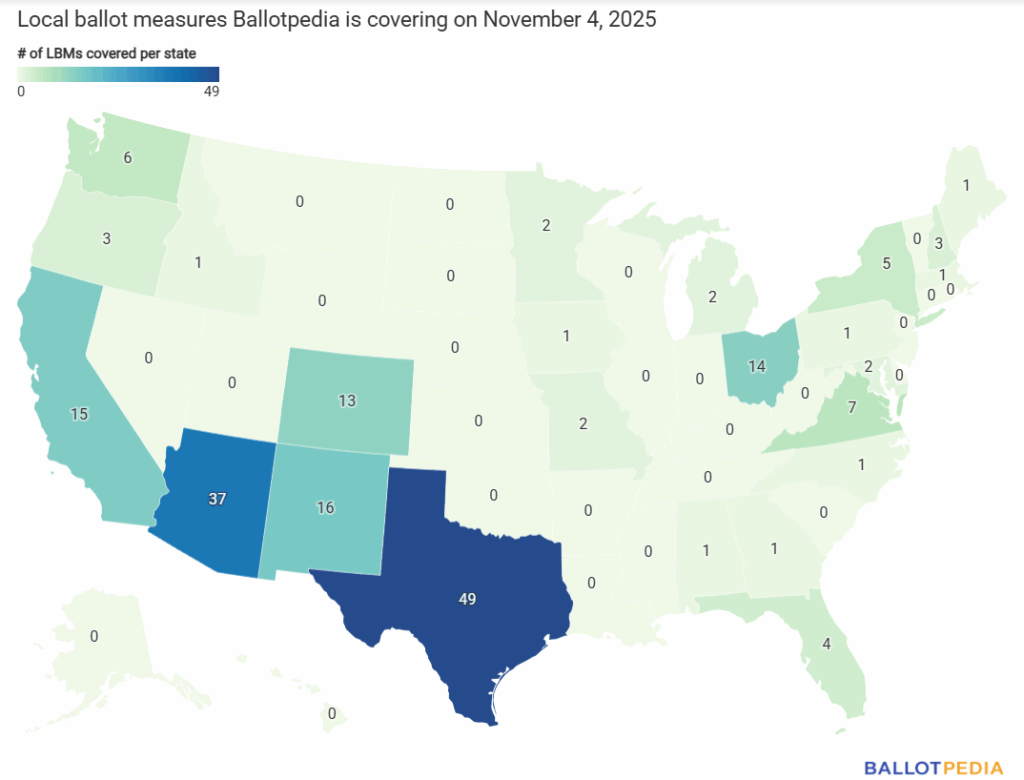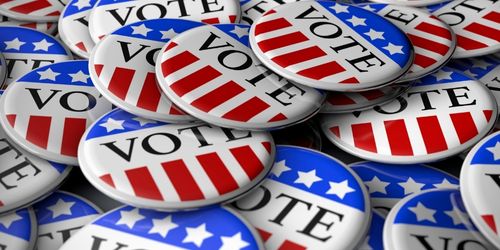Ballotpedia is covering 188 local ballot measures on the ballot on Nov. 4.
In 2025, Ballotpedia is covering local ballot measures that appear on the ballot for voters within the 100 largest cities in the U.S., within state capitals, and throughout California and Virginia. You can review the coverage scope of the local ballot measures project here.
Ballotpedia is also covering electoral system-related ballot measures, like ranked-choice voting, outside of the largest cities, as well as a selection of other measures.
The number of local measures on the ballot covered by Ballotpedia on Nov. 4 is higher than the last two odd-numbered-year election days. In 2023 and 2021, Ballotpedia covered 182 and 156 local ballot measures on each election day, respectively.
In 2023, 144 of 182 (79.1%) of these ballot measures were approved. In 2021, 109 of 156 (69.9%) were approved.
Ballotpedia is covering the most local ballot measures in Texas on Nov. 4, with 49.

In each odd-numbered year since 2021, Ballotpedia has covered more local ballot measures in Texas than in any other state. In 2023, Ballotpedia covered 33 local measures in Texas, and in 2021, 28.
Ballotpedia is covering ballot measures in 97 specific jurisdictions. The jurisdictions with the most local measures on the ballot are:
- Albuquerque, New Mexico - 11 measures
- Denver, Colorado - eight measures
- Chandler, Arizona - six measures.
The 188 local ballot measures address 55 unique topics. The top five topics addressed in the local measures on the Nov. 4 ballot are:
- City bonds - 30 measures
- District bonds - 27 measures
- Property tax - 24 measures
- Local water issues - 21 measures
- Zoning, land use, and development - 21 measures
Here’s a preview of what’s on the ballot in three of the 97 local jurisdictions that Ballotpedia is covering on Nov. 4.
New York City, New York
New Yorkers will decide five local ballot measures on Nov. 4, titled Questions 2 through 6.
Questions 2, 3, and 4 are charter amendments that address housing and land use. Question 2 would create two new expedited review processes for publicly financed affordable housing projects. Question 3 would create an expedited review process for land use changes for certain housing, affordable housing, and infrastructure projects. Question 4 would create the Affordable Housing Appeals Board, which could overturn City Council decisions that reject affordable housing projects.
Question 5 would consolidate and digitize the existing paper city map. Question 6 would move the city's local elections, including the mayoral election, to coincide with federal presidential election years, beginning in 2028. However, the change could not take effect unless the state legislature also amends Section 8 of Article XIII of the New York Constitution, and voters approve that amendment.
Denver, Colorado
Denver voters will decide eight measures on Nov. 4. One of the measures would repeal a ban on the sale of flavored tobacco products in city and county limits. The wording of the ballot question will ask voters whether the ordinance should be retained. A “Yes” vote would keep the flavored tobacco ban, while a “No” vote would repeal it.
Two of the measures in Denver are amendments to the city and county charter. The first, Referred Question 2G, would designate the two at-large positions in the Denver City Council as Seat A and Seat B. Currently, the two city council at-large positions are on the ballot together, and the seats are awarded to the two candidates that receive the greatest and second-greatest number of votes. Under the measure, the seats would be listed separately, and voters would elect one candidate to Seat A and one candidate to Seat B.
The second amendment, Referred Question 2F, would make changes to the official names of the city departments and would add the Manager of Licensing and Consumer Protection to the mayor’s cabinet.
The other five measures in Denver are bond measures that fund repairs and construction of city facilities. In total, the measures propose $949.75 million in bonds.
Bexar County, Texas
Voters in Bexar County, which includes San Antonio, will decide two local ballot measures on Nov. 4.
Proposition A would allow the county to increase the hotel occupancy tax by 2% in an effort to fund the Coliseum Complex Venue Project. It would also allow the county to use revenue from the county’s existing motor vehicle rental tax to fund the project.
Proposition B is similar; it would allow the county to increase the hotel occupancy tax by 2% and use the proceeds to build a new arena for the San Antonio Spurs. The measure would also allow the county to use revenue from the motor vehicle rental tax to fund the new arena’s construction.



